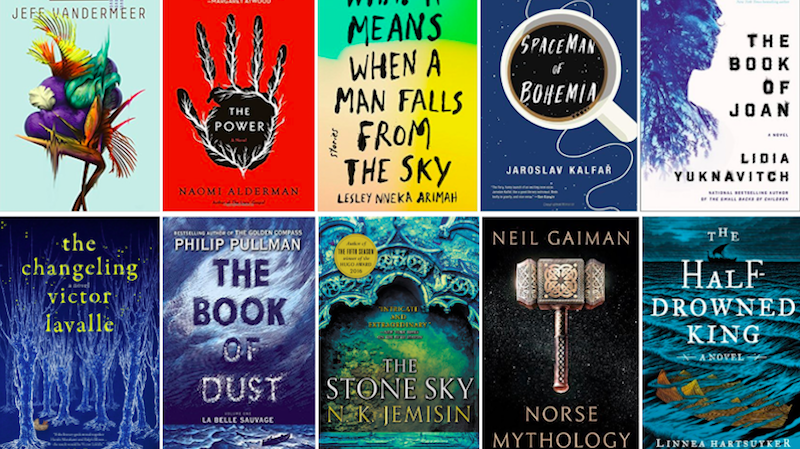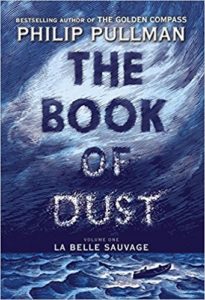
1. Borne by Jeff VanderMeer
(15 Rave, 1 Positive)
“VanderMeer’s undeniable skill as a writer keeps what could be an unwieldy blur of a plot from devolving into grim melodrama or atmospheric nihilism … Rachel, a brown-skinned, kinky-haired refugee woman, will also satisfy readers eager to see marginalized figures move to the center of an adventure novel. And there’s enough allusiveness in this story to satisfy a whole conference of literary critics. Ultimately, though, these heady delights only add to the engrossing richness of Borne. The main attraction is a tale of mothers and monsters — and of how we make each other with our love.”
–Nisi Shawl (The Washington Post)
Read an excerpt from Borne here
*
2. The Power by Naomi Alderman
(11 Rave, 3 Positive)
“I don’t think I’ve ever seen the status quo inverted to such devastating effect as in Naomi Alderman’s fourth novel … The novel is constructed as a big, brash, page-turning, drug-running, globetrotting thriller….But it’s also endlessly nuanced and thought-provoking, combining elegantly efficient prose with beautiful meditations on the metaphysics of power, possibility and change … One of the most impressive aspects of the book is how it uses a new schematics of sex and power to illuminate our reality … Why do people abuse power? The novel can’t offer any answer beyond the one already found in our world: because they can.”
–Justine Jordan (The Guardian)
*
2. What it Means When a Man Falls From the Sky by Lesley Nneka Arimah
(11 Rave, 3 Positive)
“…[a] remarkable debut collection … Of all of Arimah’s considerable skills, this might be her greatest: She crafts stories that reward rereading, not because they’re unclear or confusing, but because it’s so tempting to revisit each exquisite sentence, each uniquely beautiful description … Arimah’s collection somehow manages to be both cohesive and varied at the same time. None of the stories resemble one another, exactly, but they manage to form a book united not only by theme and by setting (the stories mostly take place in Nigeria and the U.S.), but by Arimah’s electrifying, defiantly original writing. It’s a truly wonderful debut by a young author who seems certain to have a very bright literary future ahead of her.”
–Michael Schaub (NPR)
*
4. Spaceman of Bohemia by Jaroslav Kalfar
(6 Rave, 6 Positive, 1 Mixed)
“…[a] funny and moving debut novel … A key to the book’s tone can be found in his use of humor. Kalfa? takes us on a wild ride, and he packs a lot of world history-level tragedy into his book, and this could have ruined the story. You’re already asking us to follow the first Czech into space, then there are his relationship problems, a giant alien spider, and, oh yeah, the fall of communism. But he makes it all work seamlessly by giving us quiet moments that balance grief and humor … That’s where this book’s greatness lies. By giving us a character who is a culmination of Czech history, Kalfa? is able to tackle half a century at once. And by giving that character a deeply personal problem, he’s able to ground the politics in heartbreak.”
–Leah Schnelbach (Tor)
Read an excerpt from Spaceman of Bohemia here
*
5. The Book of Joan by Lidia Yuknavitch
(8 Rave, 2 Positive, 1 Mixed, 2 Pan)
“The Book of Joan has the same unflinching quality as earlier works by Josephine Saxton, Doris Lessing, Frank Herbert, Ursula K. Le Guin and J.?G. Ballard. Yet it’s also radically new, full of maniacal invention and page-turning momentum … But while Herbert’s writing, especially in the later Dune books, was marked by an airless abstraction, Yuknavitch’s prose is passionate and lyrical, very much in the moment. Fusing grand themes and the visceral details of daily life, she offers a revisionist corrective that shows the influence of writers like Clarice Lispector and Angela Carter. Like Carter, Yuknavitch writes about the body with an easy intimacy … a rich, heady concoction, rippling with provocative ideas. There is nothing in The Book of Joan that is not a great gift to Yuknavitch’s readers, if only they are ready to receive it.”
–Jeff VanderMeer (The New York Times Book Review)
**
1. The Changeling by Victor Lavalle
(12 Rave, 3 Positive, 1 Mixed)
“What makes this novel so effective is its ability to use genre tropes in a way that doesn’t neglect (or mischaracterize) the race or class or everyday experiences of its protagonists … In addition to invigorating the naturalist novel by infusing it with horror, LaValle introduces contemporary phone and app technology into his increasingly strange story. That’s been done before…But The Changeling digs deeper, providing subtle commentary about larger issues of computer security, access, and privacy … Nobody is better at combining daily struggles and the supernatural than LaValle, and in helping us understand the convergences between the 99 percent and the things that go bump in the night.”
–Brain Evenson (Bookforum)
Read an excerpt from The Changeling here
*

2. The Book of Dust Vol 1: La Belle Sauvage by Philip Pullman
(9 Rave, 7 Positive, 1 Pan)
“I am confident in pronouncing that people will love the first volume of Philip Pullman’s trilogy, The Book of Dust, with the same helpless vehemence that stole over them when The Golden Compass came out in the mid-’90s, or even when they first met their partners or held their newborn children … The sheer polyphony of his sourcing is audacious, and it shouldn’t work, but it does; reading this novel is like standing in a room in which suddenly all of the windows have blown open at once … Pullman may write crackling adventures, but he also possesses what feels like direct access to everything that is wordless and watery in the human subconscious.”
–Katy Waldman (Slate)
*
3. The Stone Sky by N.K. Jemisin
(5 Rave, 1 Positive)
“…the fact that The Stone Sky sticks the landing of this astonishing trilogy with timeliness and rigor is the smallest, simplest thing I have to say about it. The gratitude and love I feel for these books, and for what The Stone Sky adds to the triptych, is staggering … From a storytelling perspective, The Stone Sky satisfied me completely. With the same fiercely compelling voice and character work that made the first two volumes so eminently devourable, it travels deeply difficult terrain and emerges triumphant.”
–Amal El-Mohtar (NPR)
*
4. Norse Mythology by Neil Gaiman
(1 Rave, 7 Positive, 2 Mixed)
“Norse Mythology deftly blends ancient and contemporary literature styles, paying homage to the former with the flair of the latter … When I first picked up Norse Mythology, I only planned to read a few chapters, but the deeper I got the more I felt like as if I was sitting in a Viking longhouse by a roaring fire and a cup of mead listening Gaiman recite mythic poetry … quite simply breathtaking.”
–Alex Brown (Tor)
*
5. The Half-Drowned King by Linnea Hartsuyker
(4 Rave, 2 Positive, 1 Mixed)
“…[a] white-knuckled retelling of the protohistory of Norway’s Harald Fairhair … As with the finest historical fiction, it’s a question worth asking ourselves today. Do we trust one another enough to throw our lots in together? Can these laws that we have agreed upon truly hold? The form of society is, after all, not predetermined, but rather constantly shaped by its members … This is a delightful novel, one that manages to summon the musty halls of a seemingly distant past and populate them with the complex heroes of our age.”
–Carrie Callaghan (The Washington Independent Review of Books)
***

